Pest Solutions Contribute To CBeebies Teeny Tiny Creatures TV Show. Here at Pest Solutions, we are always looking for opportunities to educate and inform when it comes to common ‘pest’ species.
That’s why we jumped at the chance to contribute to Teeny Tiny Creatures, a BBC produced TV show aired on CBeebies that helps children to learn more about the vital ecological role played by small animals and insects.
Click here to view the Episode of CBeebies Teeny Tiny Creatures…
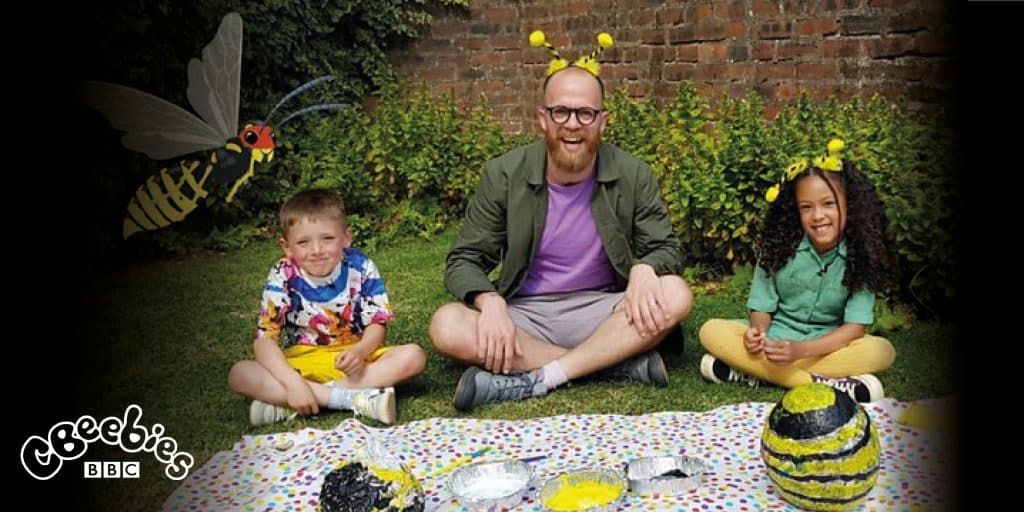
Some of the species featured on the show include worms, moths, spiders, beetles, and many more besides.
Several of the episodes focus on the importance of species that we deal with as a pest control company.
Highlighting that whilst these species can pose a threat to property and health when they get too close to humans, they cannot be considered as pests in all situations and do play an important role in the ecosystem is something we are passionate about here at Pest Solutions, with sustainability and environmental awareness at the heart of everything we do.
This is why when we were asked to provide a Wasp’s nest that we had removed from a customer’s property for examination on the CBeebies Teeny Tiny Creatures show, we were delighted to help.
We also filmed Wasp Larvae, or Grubs, emerging from the cells contained within an active nest.
The episode will air on the CBeebies channel at 15:45 on Monday 28th November.
Click here to view the Episode of CBeebies Teeny Tiny Creatures…
The wasp nest truly is one of nature’s most remarkable feats of engineering and it is no surprise that the producers of CBeebies Teeny Tiny Creatures decided to make them a key feature of the show.
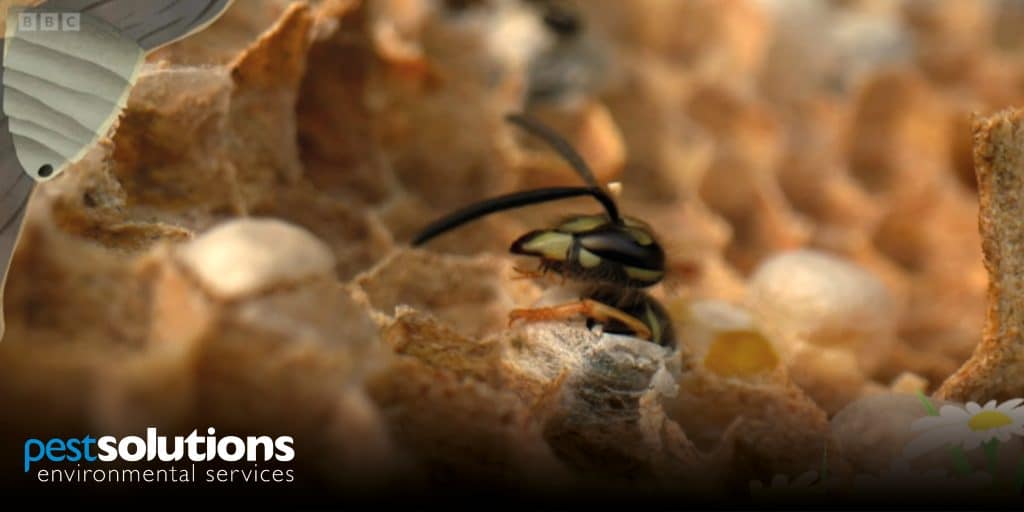
When a queen Wasp emerges from hibernation at the end of the winter, it will begin its search for somewhere to build their new nest.
Unfortunately, they aren’t as astute in this search as they are when building the nest itself and will happily settle in hollow trees, underground, or most relevantly to pest control, inside man-made structures.
Once a location has been found, the queen will begin the incredible nest building process by chewing on wood found nearby to create a pulp that is ideal for moulding purposes.
After creating an attachment point to keep the nest in place, the queen will use this pulp to create a honeycomb type structure with cells that are used to lay their eggs.
Once these eggs have hatched and the emerging worker wasps have reached adulthood, they will take over construction and the queen will continue to lay eggs until she dies.
Some Wasp nests become large, and incredibly elaborate and our technicians have seen some astounding structures when providing removal services for our customers.
With a potent sting and a tendency to linger around your summer picnic, Wasps have a pretty poor reputation, and at some point, I’m sure we have all thought: What exactly is the point of Wasps?
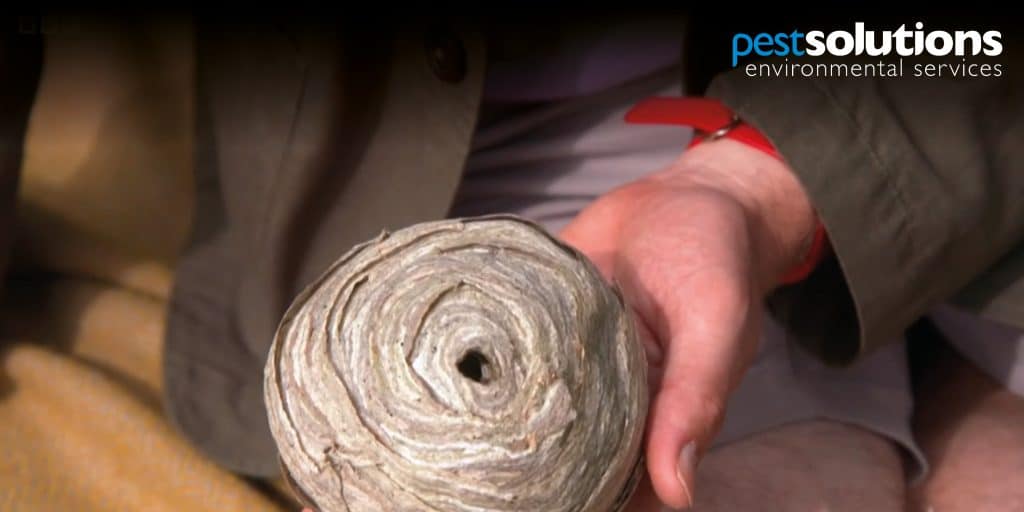
Why Get Involved With The CBeebies Teeny Tiny Creatures TV Show. As with all the species we deal with here at Pest Solutions, Wasps are not inherently bad. In fact, in most situations they are an incredibly positive species and play a vital role in the ecosystem.
Wasps pollinate plants in a similar manner to Bees and Wasps are predatory species that keep insect populations under control by targeting flies, caterpillars, and other insect pests.
In fact, estimates suggest that Wasps are responsible for a staggering 14 million kilograms of insect prey during the summer season alone.
Without Wasps, we would certainly be dealing with a lot more insect pest infestations than we already do! More importantly, this increase in insect numbers would have a devastating effect on crops and flowers.
Now, this isn’t to say that Wasps aren’t a pest in some situations.
However, whilst Wasp nest removal is a vital service that we provide to hundreds of customers every summer, we believe that it is important to help change the mindset that Wasps are universally bad.
As a pest control company, it would be all too easy for us to play up to the notion of Wasps being evil, but we are committed to a culture of sustainability and education that we believe will help to drive a more environmentally friendly future of pest control.
By participating in educational programmes such as CBeebies Teeny Tiny Creatures, we hope to help change the stigma around Wasps among the next generation, moving from a mindset of “What is the point” to one where the ecological importance of this incredible creature is better understood.
If Wasps are so great, why do we need to control them, and how do we do this in an environmentally friendly manner?
Well, a pest is considered as an animal or insect that poses a direct threat to humans, whether that is directly by spreading disease, or indirectly, creating an unsafe environment by damaging property.
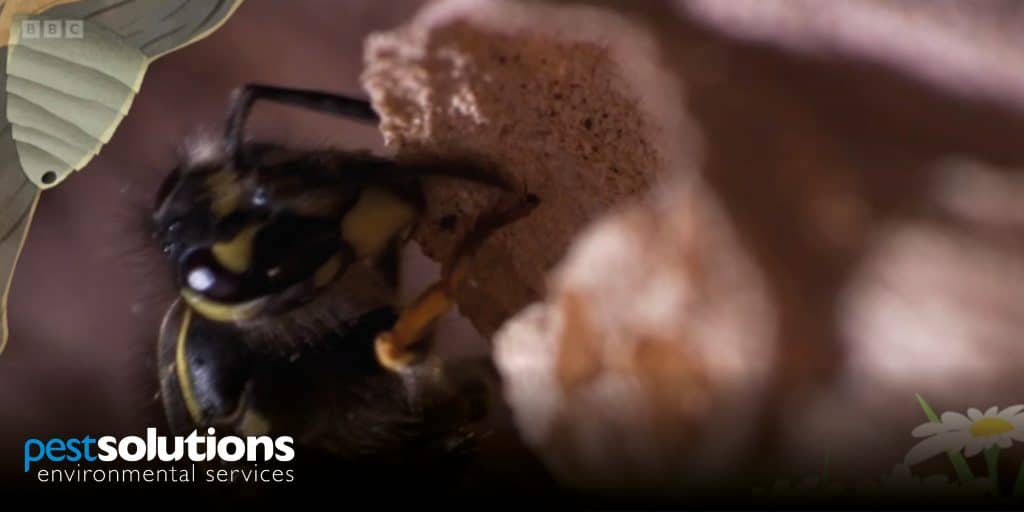
In some situations, usually when they choose to build their nests in close proximity to humans, Wasps can be classified as pests and action is required to protect those nearby.
Anyone who has found a Wasps nest inside their property knows the stress and shock that they can bring, and Wasps will sting readily if they feel that they or their fellows are under threat.
If you, or anyone else on your property is allergic to insect bites, it is critical that you have a Wasp nest removed by a professional as soon as possible as a single sting could lead to a severe reaction such as anaphylaxis in extreme circumstances.
Wasps do not carry diseases that can be spread to humans directly but can facilitate the spread of disease by landing on rotting food and other contaminated surfaces before feeding on our food or stinging us.
Due to the fact that disturbing a Wasp’s nest in any way, particularly attempting to remove it, can result in a dangerous and aggressive swarm of Wasps heading your way, it is recommended that Wasp nest removal is only ever carried out by a fully trained pest professional.
If you have found a Wasp nest on your property or are experiencing an unusually high number of Wasp encounters with no immediately obvious source, get in touch with Pest Solutions and one of our expert technicians will be happy to help.
Here at Pest Solutions, a large amount of the work that we carry out during the summer months is dealing with Wasps’ nests inside properties across the UK.
Our technicians are highly adept at doing just that (they certainly have plenty of practice!) and we pride ourselves on the quality and efficiency of our Wasp removal services.
Whilst Wasps and Bees are often grouped together, and certainly share many of the same characteristics and behaviours, they are very different species and need to be treated as such.
Bees, unlike Wasps, are incredibly unlikely to sting and should not be considered as pests in any situation, due to their ecological importance, and are therefore not a part of our remit as a professional pest control company.
We will happily put you in touch with a local beekeeper in your area who will usually be able to remove swarms of Bees without harming them with a minimum of fuss.
In fact, given the cost of acquiring a swarm of Honey Bees by other means, many beekeepers will be happy to provide this service for free.
At Pest Solutions, we are committed to not only helping rid our clients of genuine pest problems, but also to assisting in the protection of non-target and endangered species.
Bees are incredibly important to our ecosystem and have even been named as the most important living species on the planet by the Earthwatch Institute.
This is due to the fact that Honey Bees are the most prolific pollinators of flowers, crops, and other plants. Many of these rely almost solely upon the activity of Bees for their survival.
Despite their importance, Bee populations are dwindling across the globe and have fallen massively in the UK over the past few decades.
In response to these disturbing trends, there have been a number of initiatives aimed at raising awareness of the importance of Bees.
There have also been changes to pest control legislation in an attempt to rejuvenate population numbers.
The use of neonicotinoids, for example, a pesticide that affects the nervous system of insects including bees has been banned by the EU, a decision that was supported at the time by the UK Government after it was found to be a major driving force behind this decline.
The pest control industry to has had to adapt the way it operates in order to preserve Bees and other endangered species.
Whilst finding Bees in your home or business is certainly a nuisance and removing them is required, they are NOT considered a pest species in the same way that Wasps can be.
It is essential that, if possible, Bee hives are removed from the home in a safe and controlled way and relocated. I’m sure that you have heard that Bees will not sting you unless they have no other choice, and it is true that left to their own devices, Bees will do no harm to you.
However, it is understandable you may feel uncomfortable with Bees in close proximity and the noise of the swarm alongside the fact that they can cause allergic reactions in rare cases means that you may well want to have a beekeeper remove them in a safe manner.
The only situation in which it is acceptable for us to destroy a Bee’s nest would be if it poses a genuine direct threat to nearby humans, could easily be disturbed by children or pets nearby, AND the Bees cannot be rehomed nearby in a suitable manner.
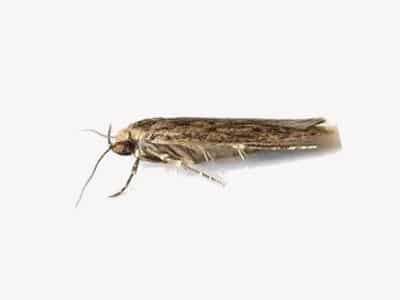
Rated 5
Out of updating... Reviews
We are open 24 hours 7 days a week to help with all pest related enquiries.
We are open 24 hours 7 days a week to help with all pest related enquiries.
We are open 24/hours 7 days a week to help with all pest related enqurirs.